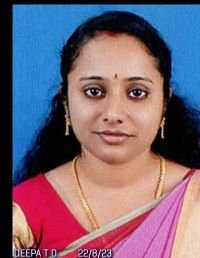

Academic Classes / Class 5 Tuition / ICSE / SCIENCE-5 / Science-Grade-5-ICSE
Deepa Td
Masters of Computer Applications from NCERC Pampady
Student's Reviews
By Several Parameters
The class 5 students will learn about science in this particular subject. Science is a subject where we study living organisms and also how our universe works . This particular subject is used in many of the fields of day to day life.
For attending this course, prior knowledge of Grade-4 Science is required, this course assumes that students have prior experience with all the topics of science of Grade4. This is not an introductory class for absolute beginners science of Grade-5. So therefore, Participants should already be familiar with the basic learning objective.
| Course | Fee per Class (In KlassCoins) | Duration | Type |
|---|---|---|---|
| Science-Grade-5-ICSE | 202.5 | 11 Months | Indiviual Classes |
Hellow pupils this side I am your tutor Deepa here I am with a aim to work innovatively for the enhancement and betterment of education. I aspire to work for an institution which offers career growth and chances to learn and improve my knowledge.
Here are some of my accomplishment which I have gathered over the years-
- Responsible for teaching the assigned subject and the projects related to the particular subject.
- Helping and guiding the students for any problems that they come across academically.
- Teaching students with Visual aids for better understanding.
- Stay updated with the changing syllabus
Present 2024 - Present :
IHRD - Lecturer, Worked as Lecturer for 4 years
Present 2024 - Present :
Teaching cart - Online tutor, I have taught students for class 4,5,6,12 etc
-
Subject Details:
Most likely I get associated with students who would like to get their concept clear in Science subjects uptll Grade 8 and also I extend my help to those who are seeking help in Computer subjet also. I have taken classes for both ICSE and CBSE students so I am familiar with both boards .
- Operating Systems : Windows 98/XP / 2007/2008
- Languages : C/C++,C#
- Technologies : ASP.Net , HTML , JavaScript, CSS
- Database: SQL Server 2008 , Microsoft Access
- Office Package: Microsoft Word, Microsoft PowerPoint,Microsoft Excel
-
Book Published Details:No data found.
-
Language Known:English
-
Total Experiance:7 Years
-
Listening & Questioning Skill:Good
-
Reading Skill:Good
-
Writing Skill:Good
-
Presentation Skill:Good
-
Online classes Experiance:No data found.
-
Award Recg:No data found.
-
Research Work:No data found.
Degree: Bachelors of Science - University: NSS College Rajakumary
Degree: Masters of Computer Applications - University: NCERC Pampady
Degree:
The class 5 students will learn about science in this particular subject. Science is a subject where we study living organisms and also how our universe works . This particular subject is used in many of the fields of day to day life.
-
Learning Objectives:
THEME 1:Human Body: The Circulatory System
THEME 2:Human Body: The Skeletal System
THEME 3:Food and Health
THEME 4:Pollination
THEME 5:Plant Reproduction
THEME 6:Solids, Liquids and Gases
THEME 7:Interdependence in Living Beings-Plants and Animals
THEME 8:Sound and Noise
THEME 9:Work and Energy
THEME 10:Light and Shadows
THEME 11:Simple Machines
THEME 12:Cleanliness and Hygiene
-
Course Outline:
Theme 1: Human Body: The Circulatory System
● identify organs of the circulatory system in a picture/model
● locate position of each organ on the human body (Cut outs);
● draw pictures of various organs of the circulatory system and label them
● describe functions of each organ and explain the process of circulation using scientific terms/words;
● differentiate between arteries and veins and name the major arteries and veins;
● explain functions of blood; discuss various ways (yoga exercises) to keep the heart healthy and strong;
● do simple yogic exercises to keep the body strong and healthy under the guidance of parents.
Theme 2: Human Body: The Skeletal System
● identify major bones of the human body and name them;
● draw diagrams of major bones and name them;
● describe functions of major bones of the human body;
● locate major joints of the human body and discuss their functions;
● draw diagrams of the shoulder and knee joints and their location in the body;
● give examples of other kinds of joints in the human body;
● identify food items that are calcium rich;
● following simple exercises (under guidance) to make bone and muscles strong;
● demonstrate correct posture to keep body healthy and strong both in sitting /standing position
Theme 3: Food and Health
● discuss various components of food required for healthy living;
● give reasons of the need for a balanced diet;
● enlist healthy and junk food items and differentiate between them;
● suggest/find out some ways to make diet healthier;
● give reasons for some deficiency diseases and find out ways to prevent/reduce them;
● develop awareness regarding adulteration in food items;
● find out diseases related to life style, including those related to food habits;
● state symptoms of some lifestyle diseases such as obesity, anaemia, diabetes, blood pressure;
● suggest some ways to avoid these diseases; infer why sprout food and fermented food is good for health;
● appreciate the use of various components of food for our body.
Theme 4: Pollination
● identify various parts of flower and label each part;
● draw diagrams of each part of a flower (after observation);
● locate parts of a flower involved in the process of pollination;
● explain/discuss process of pollination by using technical terms;
● differentiate between self and cross pollination and cite examples of each kind (showing pictures);
● recognise and relate the need of the pollination for plants.
Theme 5: Plant Reproduction
● draw and label the male and female reproductive parts of a flower;
● discuss the need for the process of fertilisation in plants;
● explain the process of fertilisation in plants;
● identify the different kinds of reproduction in plants (by observing pictures);
● cite examples of different kinds of reproduction in plants;
● identify various parts through which vegetation reproduction takes place and give examples. Give examples of each kind of seed dispersal;
● discuss the need and significance of seed dispersal
Theme 6: Solids, Liquids and Gases
● identify different forms of matter and cite examples of each based on observable properties;
● state simple properties of solids and demonstrate the same through simple activities;
● state simple properties of liquids and demonstrate the same through simple activities;
● state simple properties of gases and demonstrate the same through simple activities;
● describe composition of air and depict it diagrammatically;
● cite examples of warm and fresh air in different situations in daily life;
● differentiate between wind, breezes, storms and give examples;
● explain why ventilators and windows are needed in houses, buildings and halls;
● relate the use of fans, air conditioners and coolers in different seasons.
Theme 7: Interdependence in Living Beings-Plants and Animals
● differentiate between plants and animals based on some features (plants as producer while animals as consumers);
● infer why plants can make their own food; cite examples of producers and consumers;
● classify living beings as producers and consumers; explain the food chain by taking examples as seen in daily life;
● identify decomposers, scavengers and cite their examples; discuss and explain causes of imbalance in nature;
● generalise/ infer the effect of hunting, forest fires in the environment.
Theme 8: Sound and Noise
● identify objects that produce pleasant sounds and objects that produce unpleasant sounds;
● recognise sounds produced by some common objects;
● identify sounds produced by some animals and mimic them;
● identify sounds produced by trees and fallen leaves;
● appreciate the importance of sound as a warning signal to save life;
● enlist causes of noise pollution;
● suggest some ways to reduce noise in the surroundings;
● discuss how loud sound affects health.
Theme 9: Work and Energy
● indicate various food items that give more energy than other food items;
● discuss the meaning of work by taking examples from daily life;
● cite examples and explain the situations where work is done/ work is not done;
● demonstrate through activity, work done/ work not done, in different situations;
● explain why energy is needed for work;
● differentiate between work and energy with examples;
● give examples from daily life of the amount of energy required for different kinds of work;
● enlist different forms of energy (light, electricity, heat, sound) and give examples of each kind and appreciate the importance of energy (light) in daily life.
Theme 10: Light and Shadows
● conduct simple activities by using various objects and classify them;
● record observations of each object (as kind of material);
● conduct simple experiment/activity to form the shadow (with the support of elders);
● infer why a shadow is formed and what conditions are required for its formation;
● enlist changes seen in sun in the morning, afternoon, evening and night (advise not to see sun with naked eyes);
● infer why day/night are formed;
● differentiate between different motions of earth (revolution of earth);
● explain the phenomenon of solar eclipse in simple language.
Theme 11: Simple Machines
● appreciate the discovery and use of simple tools/machines in daily life;
● enlist tools/ simple machines used in day to-day life;
● classify simple machines based on their working principles (levers I, II, III);
● give examples of each kind of simple machines;
● discuss the need for levers to form different kinds of machines;
● draw picture of each kind of machine and label major parts;
● conduct simple experiments/activities to demonstrate how simple machines function
Theme 12: Cleanliness and Hygiene
● demonstrate when and how to wash their hands for healthy living;
● identify causes of source disease which occur due to unclean surroundings, personal hygiene;
● develop awareness and sensitivity towards keeping public places clean;
● share cleanliness issues with family members so that healthy habits can be developed among family members as well;
● identify degradable and non-degradable garbage in the surroundings and give examples of each;
● discuss how to reduce non-degradable garbage to keep the surroundings clean;
● create slogans and demonstrate how to dispose-off garbage in the surroundings.
-
Recomended Audience:
The audience of this course is students of Grade-5 from ICSE Board. All the Chapters are well designed and its coverage as per latest curriculum released by the board. Still Student have complete flexibility to enhance or modify the course coverage during the course of learning process with Teacher. We are expecting that students of Grade-5 should drive their classes with Teacher as per chapters mentioned and also as per syllabus of their school and applicable School district or Board.
-
Pre-Requisite Requirement:
For attending this course, prior knowledge of Grade-4 Science is required, this course assumes that students have prior experience with all the topics of science of Grade4. This is not an introductory class for absolute beginners science of Grade-5. So therefore, Participants should already be familiar with the basic learning objective.
-
Course Level:Intermediate
-
Language of Teaching:English
-
Class Schedule Availiability:Evening






